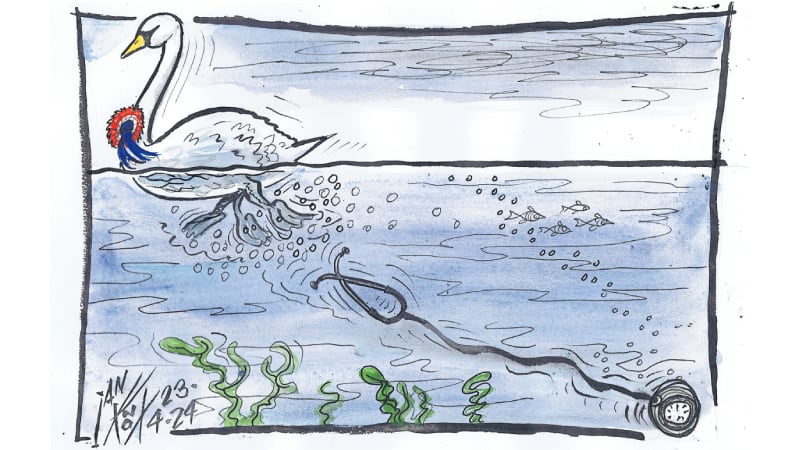Peter Heathwood is what one might call a gentleman, kind and decent with a gentle manner. He is just one of many thousands who were injured during the Troubles through no fault of his own.
He trained as a teacher but found it difficult to get a permanent job. He left teaching and went to work in the insurance industry. He was married with three children and like many was working hard to try and secure a bright future. With this in mind he bought a house and set about making it his home, a place of comfort and a safe haven for his family.
One evening Peter was sitting bouncing his little daughter in a rocker when the doorbell rang. His wife Ann went to answer the door only to be confronted by gunmen who grabbed her. In the struggle that followed Peter was shot. Lying there Peter’s thoughts were with his father and he urged his wife to let his father know that he was okay.
The ambulance crew couldn’t get the stretcher in to bring Peter out so they improvised using a body bag.
Just as they brought him out
Peter’s father arrived. Seeing him in a body bag he believed he had lost his son. “Oh, my poor Peter,” he cried before dropping dead from a heart attack.
Peter Heathwood’s attack was a case of mistaken identity. His life would never be the same again.
His father was dead. His wife could never live with having let the gunmen in. Peter was paralysed.
His children lost their grandfather and in many ways lost the parents they had known up to this point.
Peter has nothing but respect for the uniformed officers who helped him and his family that day but also is convinced that while loyalists carried out the attack they were aided by the RUC Special Branch.
There were many such murders that bore the signs of collusion between forces of the state and paramilitaries.
Having been sacrificed by them in 1979 as part of the dirty war it appears he and his fellow victims are once again being sacrificed by both state and those who legitimise the actions of the paramilitaries.
In what warped world would we equate the loyalist paramilitaries with Peter Heathwood?
I would urge Sinn Féin to stop spurting this nonsense about ‘not creating a hierarchy of victims’.
There is a hierarchy of victims and those who were paralysed, lost limbs and blinded sit right at the very top of it.
For once do the right thing for our victims or are we truly and literally the ‘ourselves alone’ party?
DENISE JOHNSTON
Magherafelt, Co Derry
‘Bandit country’ kids deserve same education opportunities as in leafy BT9
As society emerges and finds its feet in a ‘post-Covid-19’ world we are constantly reminded of the ‘new normal’ and should use this opportunity to take stock of how we as a society approach a whole manner of issues.
Academic selection is now a hot button issue which it hasn’t been in some years. I congratulate the courage and vision of many Catholic grammar schools who have abandoned this outdated and unfair process – I was amused to see the opinion piece in this publication referring to the schools in Newry and South Down as bandit country. As a child educated in South Armagh I can say unequivocally that there have been many educators who have been rocking the educational establishment for many decades in bandit country.
I was educated in an all-ability school, which allowed each child to reach their full potential and equality of opportunity was absolute, and so it should be. It is disheartening to see some institutions, especially those purporting to have a Catholic ethos, prop up this uncharitable and unjust selective system.
Surely now is the time to discard social distancing in terms of socio-economic advantage and disadvantage? A child growing up in ‘bandit country’ should have the same equality of opportunity in their educational choices as those in the leafy suburbs of BT9. If the status quo prevails we are doomed to repeat an endless cycle of children scarred and limited by a system which was not perfect at its inception in the 1940s and hasn’t improved much since.
Nelson Mandela is often quoted as saying ‘Education is the most powerful weapon which you can use to change the world’. Minister Weir, we are watching and we are waiting.
BRIAN WATTERS
Keady, Co Armagh
Governors must be held to account over transfer tests
The time has come for members of the board of governors of local grammar schools to explain why they continue to support academic selection at 11 despite it being scrapped by the assembly in 2008 and universally criticised in report after report.
School governors are using Covid-19 as a smokescreen behind which they can talk about welcoming the delay in this year’s tests when the reality is that academic selection at 11 is wrong. It doesn’t work and it results in educational disadvantage particularly for children from working-class families.
Numerous reports and studies undertaken repeatedly confirm that academic selection reinforces ‘privilege and disadvantage’ and recommend the end of academic selection in Northern Ireland as a key way to reverse educational disadvantage.
Some grammar schools have decided to proceed this year without the use of selection tests because coronavirus makes sitting the tests unsafe. If testing is not needed this year, it is not needed any year.
Those opposed to academic selection – parents, teachers, trade unions and others – must reignite this debate and campaign for the complete and final abolition of academic selection at 11. An explanation from school governors would be a good place to start.
JOANNE LOWRY
Workers Party, West Belfast
Where do our bishops stand on issue of social injustice?
THE Irish News recently reported Pope Francis saying that the Covid-19 outbreak has exposed divisions in society and has put a spotlight on hypocrisy. He called for a different attitude to the poor, for personal conversion and reconnection. It is also a time for integrity, radical personal change and attitudinal and cultural transformation.
Yet on the same page when the Bishop of Down and Connor is asked by The Irish News if he believed schools should use non-academic criteria for one year, or agree to a longer term phasing out of entrance tests, he prevaricated.
Surely, in the present circumstances, if not always, the use of academic criteria represents a structural injustice which bishops ought to highlight. Some of the northern bishops have indeed shown leadership and taken a stand by making their views known and ought to be commended. Are we not entitled to know exactly where our ecclesiastical leaders stand on this issue of social justice?
PADDY WARD
Randalstown, Co Antrim







